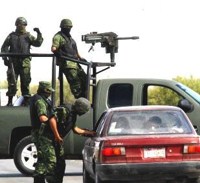In mid-July, Mexican authorities captured Miguel Angel Trevino Morales, leader of the Zetas, a major Mexican drug trafficking organization known for its brutality. In an email interview, Brian Phillips, research professor at the Center for Research and Teaching in Economics (CIDE) in Mexico City whose research focuses on subnational political violence, discussed Mexico’s strategy of capturing or killing the leaders of drug organizations.
WPR: What is the rationale behind Mexico's kingpin strategy?
Brian Phillips: Mexico focuses on arresting “kingpins,” high-level members of drug-trafficking organizations (DTOs), because it is trying to reduce the power and violence associated with these groups. The concern is not only about the flow of drugs, but the fact that the DTOs are corrupting municipal and even higher levels of government, and are essentially controlling territory in some areas. Under Felipe Calderon, president from 2006 to 2012, the government arrested or killed dozens of cartel leaders. The current president, Enrique Pena Nieto, has a somewhat different approach to the drug war, but his security forces continue to arrest leaders of DTOs. Taking down cartel leaders is supposed to weaken the groups, and therefore prevent them from being so threatening to the government and public.

